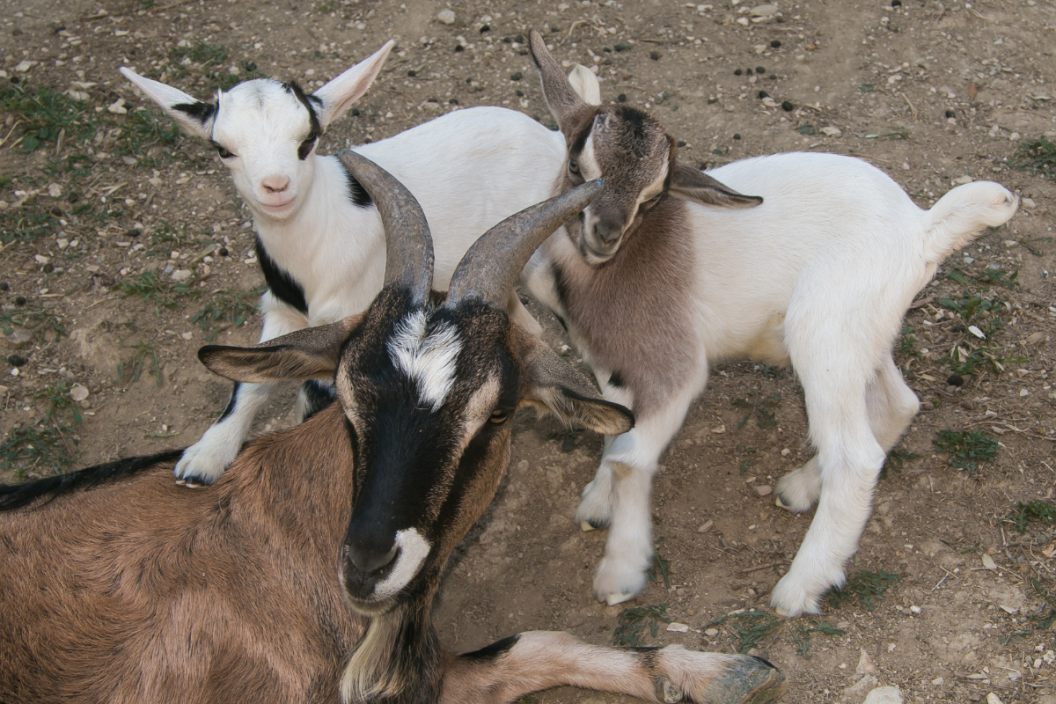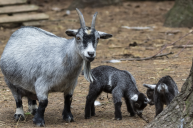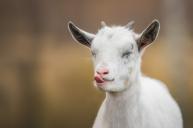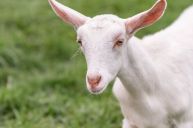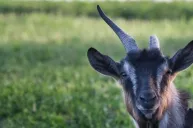Get your own goat milk & cheese from a friendly little Nigerian Dwarf goat.
The Nigerian Dwarf goat was brought to the United States in the 1950s. Since then, these little goats have been used as both milk production and companionship animals.
Nigerian Dwarf goats are known for their even tempers and gentle, playful personalities. Due to these qualities and their small size, they have made a name for themselves as great family pets. In addition, they are easily trainable and wonderful with children, making them attractive to youth or first-timers participating in 4-H or FFA clubs. Their personalities also make them perfect service animals for nursing homes and hospitals.
Size and Characteristics
https://www.instagram.com/p/Brpxm8rBWME/
According to the Columbian Park Zoo, this West African breed is found all over the world today. While the goat hails from West Africa, other goats like American pygmy goats descend from this breed. Nigerian dwarf does stand between 16 and 21 inches tall at the wethers, and dwarf bucks can grow to be 23.5 inches tall at the wethers.
These goats' ideal weight is between 60 and 80 pounds, on average, and because they come in a variety of color combinations, you can assemble a distinctive and beautiful herd. While these goats may be smaller than larger dairy goats, their conformation is similar, and their bodies are quite proportionate.
Care and Feeding
They are hardy animals that thrive in almost any climate and, due to their size, require less space to graze and play than full-size dairy goats. They are also very adaptable and live comfortably with other livestock such as cattle, horses, llamas, and donkeys.
These goats may be small in size, but they require lots of room to play and explore. Therefore, their living areas need to include "toys" such as tree stumps, rocks, and other large climbing structures that they can entertain themselves with. Adequate fencing is another requirement since a miniature goat can be quite the escape artist.
Nigerian Dwarf goats also require proper feed to thrive. Most importantly, your goats will need free-choice access to quality hay and forage. In addition, goats will need free-choice access to a goat mineral to help balance their diets. Pregnant does, or nursing does as well as young kids will also need grain to help supplement their diets. And, of course, be sure to also provide plenty of fresh, clean water.
Nigerian dwarf goats who live at the zoo are fed similar diets, and many are used in petting zoos, being hand-fed by visitors.
Milking Nigerian Goats
For many people, the appeal of the Nigerian Dwarf goat is the combination of their milking ability and compact size. When milking, they produce between three and four pounds of 6% to 10% butterfat content in their milk per day. One Nigerian Dwarf goat produces about 2 quarts of milk in a day which is a surprising amount of milk for such a small animal. Thus, a grouping of miniature dairy goats can become the perfect little Nigerian dwarf dairy for families to enjoy.
Nigerian Dwarf goats are unique milking goats because their milk is higher in protein than milk from most other dairy goat breeds. The higher butterfat percentage also gives their milk a rich, sweet taste that you can't beat.
Breeding
https://www.instagram.com/p/CSfIoiWrR4D/
When it comes to breeding, Nigerian Dwarf goats can be bred year-round. Does can be bred as early as seven months, but it is recommended to wait until they are fully grown at one year in age. Bucks are ready to be bred at seven or eight months of age, but they have been known to be ready at ages as young as three months.
The gestation period is between 145 to 153 days and does usually has between three or four kids at a time. However, it's not uncommon for this number to be five or more. Nigerian Dwarf goats generally have easy births with few problems, and kids are born at an average of around two pounds. When cared for properly, the Nigerian Dwarf goat can have a lifespan of 12 to 14 years.
Buying a Nigerian Dwarf Goat
https://www.instagram.com/p/BzNQr2DJUSW/
If you're looking to purchase your own Nigerian Dwarf goat, the best place to start at one of their North American or global registries. Currently, they are registered in five registries:
? Nigerian Dairy Goat Association (NDGA)
? American Goat Society (AGS)
? International Dairy Goat Registry (IDGR)
? American Dairy Goat Association (ADGA)
? Canadian Goat Society (CGS)
The cost of purchasing a Nigerian Dwarf goat varies depending on the quality of the goat you are looking to purchase. For breeding or pedigree quality goats or those with unique or rare coloring, the cost is between $200 or $500 per head. A pet-quality Nigerian Dwarf goat will range between $50 and $100 per head.
These small goats can make wonderful pets and may be the perfect choice for a homesteader or family. They produce a decent amount of milk given their small stature and require minimal acreage compared to larger breeds of goats.
Do you have a Nigerian Dwarf goat? Tag us in your pictures using #WideOpenPets or share on our Wide Open Pets Instagram.
READ MORE: Miniature Cows Exist, And Here Is the Adorable Proof!
